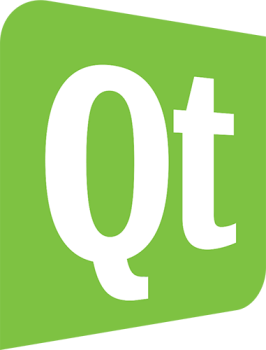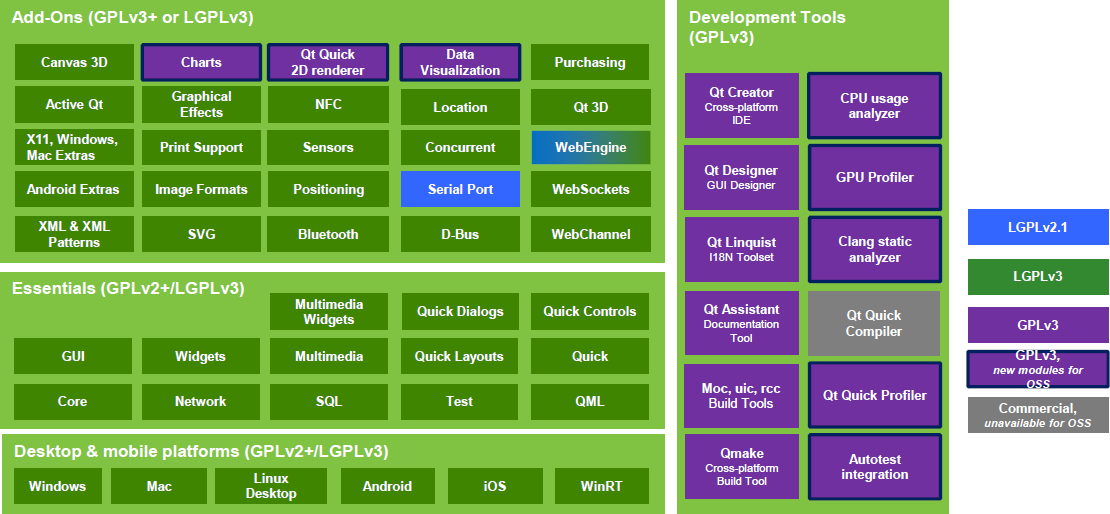The Qt project changes the license and opens the code for some modules.
Last week, Qt Company (a division of Digia) updated the text of the agreement with the KDE Free Qt Foundation and announced a new licensing policy for Qt.
The KDE Free Qt Foundation was founded in 1998 to protect Qt as free software. An agreement was signed between the organization and the Trolltech company that allows, in the event that the free version of Qt is discontinued, to release Qt under a BSD type license (or any other free). The contract was updated as the rights to Qt passed to Nokia, and then to Digia.
Details of the new Qt licensing policy under the cat.
')

Qt has long been released under the LGPLv2.1 license. In version 5.4, the LGPLv3 license was added and now the transition to the third version of the GPL and LGPL is planned. Starting with version 5.7, Qt will no longer be available under the LGPLv2.1 license. However, the core modules will also be available under GPLv2 to maintain compatibility with software released under the second version of the GPL.
Switching to the third version of the GPL / LGPL provides the following benefits:
It is worth noting that a software developer can apply tivization if he uses a commercial version of Qt, or a version under GPLv2.
The changes do not affect the next version of Qt 5.6, which should be released in February. Qt 5.6 will be a release with a long support period (3 years).
Now let's see which licenses will be supported by different Qt components.
As a result, all components are available in a commercial license and in GPLv3, most components are also available under LGPLv3 and GPLv2. The list of modules for version 5.5 can be found here .
For illustration, I will give a visual scheme (picked up here ):

Note: Apparently, about the Serial Port error - it should be LGPLv3.
The following modules will appear as part of the open version of Qt 5.7:
For Qt 5.6, these modules will not be supplied, but you can build it yourself from source codes. Qt Quick Compiler is planned to be integrated into Qt QML in version 5.8.
Initially, the agreement concerned only the X11 platform (plus, Android was added a few years ago). The new agreement extends the scope to Microsoft Windows, Microsoft Windows Phone, Apple MacOS and Apple iOS. An organization may also extend the agreement to a successor platform (for example, Wayland for X11).
In accordance with the new licensing policy, to use all modules of the open version of Qt, you need to use the version under GPLv3, i.e. Software must be released under a GPLv3 compatible license. For proprietary software, you must use either the commercial version or do not use new modules. These changes do not affect version 5.6, which will be supported for 3 years, as well as the commercial version.
A small addition to the commercial version: it is planned to release a cheaper version of Qt for Start-Ups. Details yet, promise to release during the first quarter of 2016.
The KDE Free Qt Foundation was founded in 1998 to protect Qt as free software. An agreement was signed between the organization and the Trolltech company that allows, in the event that the free version of Qt is discontinued, to release Qt under a BSD type license (or any other free). The contract was updated as the rights to Qt passed to Nokia, and then to Digia.
Details of the new Qt licensing policy under the cat.
')

License change
Qt has long been released under the LGPLv2.1 license. In version 5.4, the LGPLv3 license was added and now the transition to the third version of the GPL and LGPL is planned. Starting with version 5.7, Qt will no longer be available under the LGPLv2.1 license. However, the core modules will also be available under GPLv2 to maintain compatibility with software released under the second version of the GPL.
Switching to the third version of the GPL / LGPL provides the following benefits:
- Protection against patent claims by the software provider.
- Tivoisation protection .
- Compatible with Apache license.
It is worth noting that a software developer can apply tivization if he uses a commercial version of Qt, or a version under GPLv2.
The changes do not affect the next version of Qt 5.6, which should be released in February. Qt 5.6 will be a release with a long support period (3 years).
New licensing policy
Now let's see which licenses will be supported by different Qt components.
- The main libraries (Qt Essentials), as well as add-ons (Qt Add-ons), whose code is now open, will be available under the LGPLv3 and GPLv2. Qt WebEngine will also be available under the LGPLv2.1 (due to dependence on Chromium).
- New additions (Qt Charts, Qt Data Visualization, etc.) will be available under GPLv3.
- Development tools (Qt Tools, moc, Qt Creator, etc.) will be available under GPLv3.
As a result, all components are available in a commercial license and in GPLv3, most components are also available under LGPLv3 and GPLv2. The list of modules for version 5.5 can be found here .
For illustration, I will give a visual scheme (picked up here ):

Note: Apparently, about the Serial Port error - it should be LGPLv3.
New open modules
The following modules will appear as part of the open version of Qt 5.7:
- Qt Charts
- Qt Data Visualization
- Qt Virtual Keyboard
- QML Profiler
- Clang static analyzer
- Qt Test Integration
- Qt Quick 2D renderer
For Qt 5.6, these modules will not be supplied, but you can build it yourself from source codes. Qt Quick Compiler is planned to be integrated into Qt QML in version 5.8.
Update agreement with KDE Free Qt Foundation
Initially, the agreement concerned only the X11 platform (plus, Android was added a few years ago). The new agreement extends the scope to Microsoft Windows, Microsoft Windows Phone, Apple MacOS and Apple iOS. An organization may also extend the agreement to a successor platform (for example, Wayland for X11).
Results
In accordance with the new licensing policy, to use all modules of the open version of Qt, you need to use the version under GPLv3, i.e. Software must be released under a GPLv3 compatible license. For proprietary software, you must use either the commercial version or do not use new modules. These changes do not affect version 5.6, which will be supported for 3 years, as well as the commercial version.
A small addition to the commercial version: it is planned to release a cheaper version of Qt for Start-Ups. Details yet, promise to release during the first quarter of 2016.
Additional Information
Source: https://habr.com/ru/post/275725/
All Articles